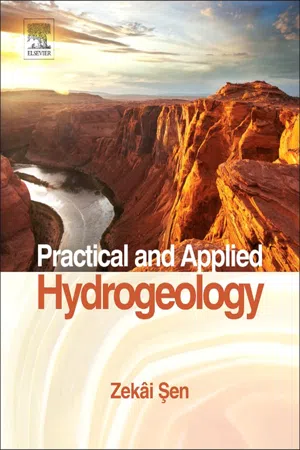
- 424 pages
- English
- ePUB (mobile friendly)
- Available on iOS & Android
eBook - ePub
Practical and Applied Hydrogeology
About this book
Applications in Hydrogeology for Geoscientists presents the most recent scientific developments in the field that are accessible yet rigorous enough for industry professionals and academic researchers alike.
A multi-contributed reference that features the knowledge and experience of the field's experts, the book's chapters span the full scope of hydrogeology, introducing new approaches and progress in conceptualization, simulation of groundwater flow and transport, and progressive hydro-geophysical methods. Each chapter includes examples of recent developments in hydrogeology, groundwater, and hydrology that are underscored with perspectives regarding the challenges that are facing industry professionals, researchers, and academia.
Several sub-themes—including theoretical advances in conceptualization and modeling of hydro-geologic challenges—connect the chapters and weave the topics together holistically. Advances in research are aided by insights arising from observations from both field and laboratory work.
- Introduces new approaches and progress in hydrogeology, including conceptualization, simulated groundwater flow and transport, and cutting edge hydro-geophysical methods
- Features more than 100 figures, diagrams, and illustrations to highlight major themes and aid in the retention of key concepts
- Presents a holistic approach to advances in hydrogeology, from the most recent developments in reservoirs and hydraulics to analytic modeling of transient multi-layer flow and aquifer flow theory
- Integrates real life data, examples and processes, making the content practical and immediately implementable
Tools to learn more effectively

Saving Books

Keyword Search

Annotating Text

Listen to it instead
Information
Chapter 1
Water Science Basic Information
Abstract
Water science, in general, is concerned with holistic view of water issues globally including social, engineering, agricultural, domestic, and industrial facets. Hydrology is its part, which deals with distribution, movement, quantity, and quality in nature from point of view of physical and chemical properties. Hydrogeology concentrates on the same issues for subsurface water circulations in different geological formations and abstraction for various human activities. Hydraulics takes into consideration water movement in human made structures. There are basic water science principles and information that provide common bases for all water exploitation, abstraction, consumption, management, quantity, and quality assessments. This chapter provides such basic information by exposing simple methods of rainfall, evaporation, runoff, and infiltration processes in relation to subsurface flow with specification of geological formations as their capacity to store and yield groundwater. Practical and applied solved examples are presented for better understanding of each one of these processes.
Keywords
Evaporation; Geological formations; Groundwater; Hydrogeology; Hydrology; Infiltration; Rainfall; Runoff1.1. Hydrology (Water Science) Elements
Hydrology is the science of water occurrence, movement and transport in nature. It gives weight toward the study of water in the Earth and is concerned with local circulations related to the atmosphere, lithosphere, biosphere, and hydrosphere leading to water movement, distribution, quality, and environmental aspects. Broadly, it deals also with the physical as well as chemical relationships. In general, it is concerned with natural events such as rainfall, runoff, drought, flood and runoff, groundwater occurrences, their control, prediction, and management. On the application side, hydrology provides basic laws, equations, algorithms, procedures, and modeling of these ev...
Table of contents
- Cover image
- Title page
- Table of Contents
- Copyright
- Dedication
- Preface
- Chapter 1. Water Science Basic Information
- Chapter 2. Basic Porous Medium Concepts
- Chapter 3. Groundwater Hydraulics and Confined Aquifers
- Chapter 4. Unconfined Aquifers
- Chapter 5. Groundwater Quality
- Chapter 6. Groundwater Management
- Index
Frequently asked questions
Yes, you can cancel anytime from the Subscription tab in your account settings on the Perlego website. Your subscription will stay active until the end of your current billing period. Learn how to cancel your subscription
No, books cannot be downloaded as external files, such as PDFs, for use outside of Perlego. However, you can download books within the Perlego app for offline reading on mobile or tablet. Learn how to download books offline
Perlego offers two plans: Essential and Complete
- Essential is ideal for learners and professionals who enjoy exploring a wide range of subjects. Access the Essential Library with 800,000+ trusted titles and best-sellers across business, personal growth, and the humanities. Includes unlimited reading time and Standard Read Aloud voice.
- Complete: Perfect for advanced learners and researchers needing full, unrestricted access. Unlock 1.4M+ books across hundreds of subjects, including academic and specialized titles. The Complete Plan also includes advanced features like Premium Read Aloud and Research Assistant.
We are an online textbook subscription service, where you can get access to an entire online library for less than the price of a single book per month. With over 1 million books across 990+ topics, we’ve got you covered! Learn about our mission
Look out for the read-aloud symbol on your next book to see if you can listen to it. The read-aloud tool reads text aloud for you, highlighting the text as it is being read. You can pause it, speed it up and slow it down. Learn more about Read Aloud
Yes! You can use the Perlego app on both iOS and Android devices to read anytime, anywhere — even offline. Perfect for commutes or when you’re on the go.
Please note we cannot support devices running on iOS 13 and Android 7 or earlier. Learn more about using the app
Please note we cannot support devices running on iOS 13 and Android 7 or earlier. Learn more about using the app
Yes, you can access Practical and Applied Hydrogeology by Zekâi Şen in PDF and/or ePUB format, as well as other popular books in Physical Sciences & Geology & Earth Sciences. We have over one million books available in our catalogue for you to explore.